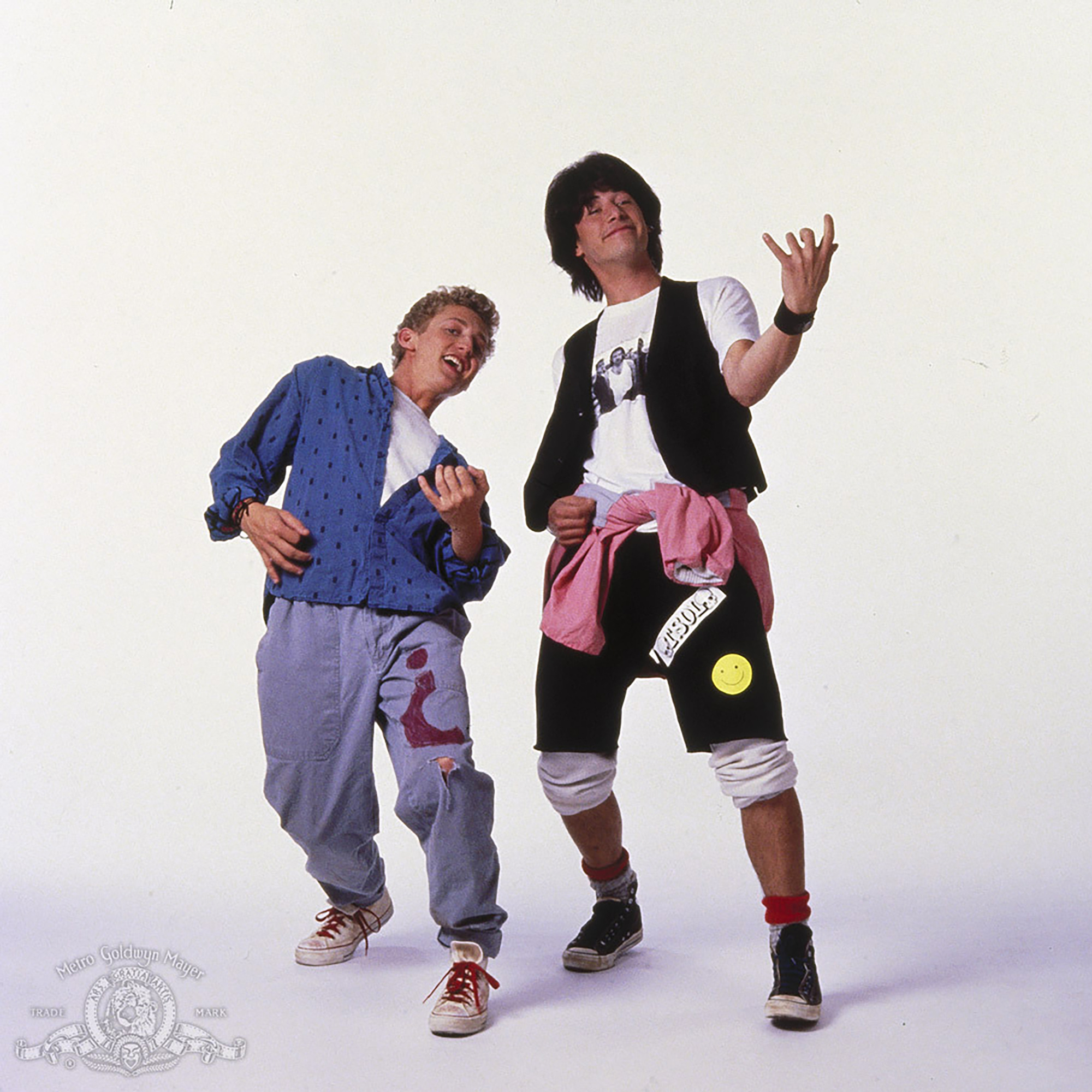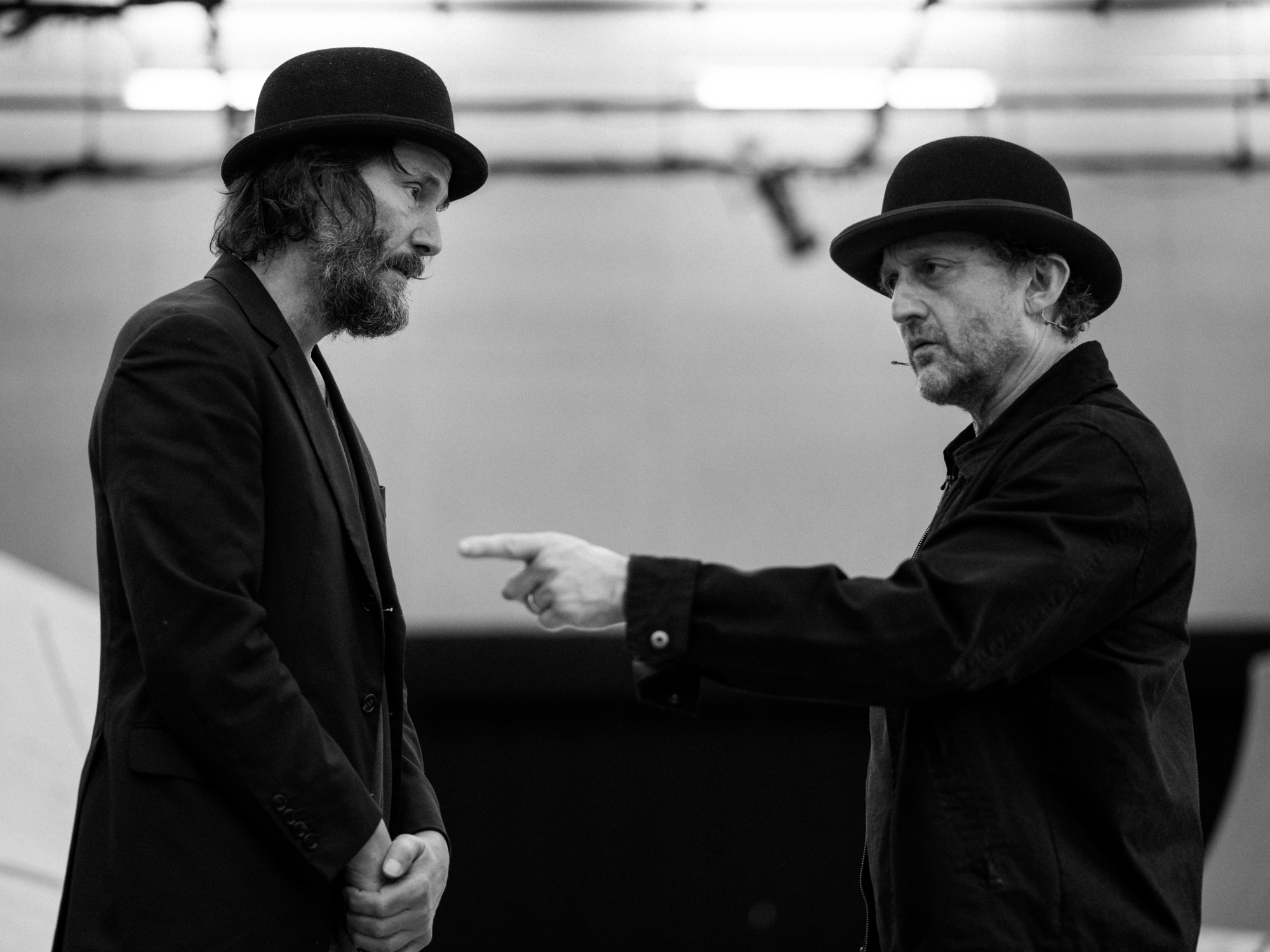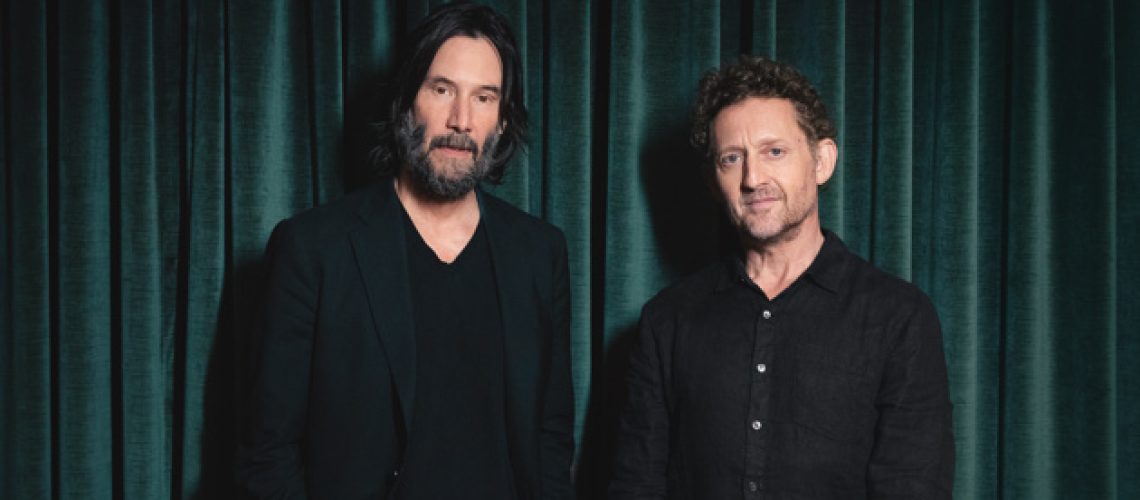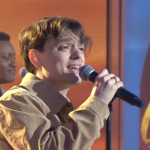Starting this week at Broadway’s Hudson Theatre, Keanu Reeves and Alex Winter play the put-upon pair of Estragon and Vladimir in director Jamie Lloyd’s take on Samuel Beckett’s deep, empty abyss of a play, Waiting for Godot. It’s fair to call this an unexpected collaboration for the duo best known for Bill and Ted’s Excellent Adventure. But it’s also an extension—and expression—of one of Hollywood’s most enduring friendships.
KEANU AND ALEX AND BILL AND TED
Keanu Reeves and Alex Winter met in the mid-1980s as young actors auditioning for the title roles in Bill and Ted’s Excellent Adventure, a low-budget comedy about two time-traveling teens. The film follows William “Bill” S. Preston Esq. and Ted “Theodore” Logan, two air guitar-shredding high school goofballs from San Dimas who hurtle around the space-time continuum, collecting historical figures along the way.
The auditions dragged on for weeks with dozens of prospective Bills and Teds tested in endless combinations. When Keanu and Alex met, they clicked immediately. They both showed up on motorbikes. They both played bass. They were both huge fans of Monty Python.
There were other points of connection, too. They both came from what Winter describes as “artsy, European, quasi-intellectual families.” Winter grew up in London, St. Louis and New Jersey. His parents ran a dance company before their divorce. He trained in theater and dance from a young age, performing in The King and I on Broadway and touring with Peter Pan. Reeves’ upbringing was similarly unconventional. After his parents split when he was three, he grew up with a series of stepfathers, including a stage and film director who encouraged his acting. Reeves lived in Beirut to Sydney, then New York, and eventually Toronto.
The two quickly realized they were kindred spirits. “I share the sense of humor and the way we kind of look at the world and existence,” said Reeves. “That mixture of humor and intelligence… Yeah, I don’t get that anywhere else.” There probably weren’t too many would-be Bills and/or Teds drawing on their knowledge of 16th-century Italian theatrical forms during the auditions. “We’re riffing on Bill and Ted,” recalled Reeves, “and talking about commedia dell’arte.”
As the auditions wore on, they started hanging out, jamming together on bass. (Worth noting here that “jamming” on bass requires the musicians to stay even more attuned to one another, in order to avoid intruding on each other’s sonic frequencies.)

When they both landed the roles, they were thrilled. “It’s like when you start at a new school, you’re like, ‘Oh great, you’re going to be in my class,’” said Winter.
Reeves, whose career was just beginning to take off, had just starred in the moody teen drama River’s Edge; Bill and Ted must have felt like a joyride by comparison. For Winter, the experience was far more profound. He later called the movie—his camaraderie with Reeves no doubt in mind—as “therapeutic,” a key part of his recovery after being a victim of abuse as a child performer on Broadway. “It was really, really helpful for me mentally,” he said. “And it was a great environment. The world of Bill and Ted is a very sweet and fun place to run around in.”
In reality, Reeves, who struggled with dyslexia, had a tough time in high school, while Winter’s early years were consumed by his work as a child actor. Through Bill and Ted, they finally got a taste of the carefree high school experience they had missed out on—together.
STILL JAMMING AFTER ALL THESE YEARS
Due in no small part to its leads’ easygoing onscreen chemistry, Bill and Ted’s Excellent Adventure became a cult hit. It also marked the beginning of a lifelong bond. “There’s very little constancy in this business,” Winter said. “You come together on a set, you’re like, ‘We’re like a family!’ And then it’s, ‘OK, bye.’ You never, ever see them again.” But the pair stayed in touch after the first movie and its 1991 sequel, Bill and Ted’s Bogus Journey, even as Reeves’ career took off and Winter shifted to documentary filmmaking. They got to know each other’s families, went on vacations together and took to calling each other “brother.”
Bill and Ted writers Chris Matheson and Ed Solomon pitched their idea for a third movie to Reeves and Winter about 20 years ago, during a barbecue at Winter’s place. Years later, both reflected on the deeper meaning of the franchise, and their characters’ immortal exhortation to “Party on, dudes.” Their responses suggest a surprisingly philosophical lens through which to view the films—anticipating the themes of their next collaboration. “Bill and Ted is really about friendship,” Winter said. “Which means it’s about community. Which means it’s about the interconnectedness of people. And being passionate about that interconnectedness.”
“We’ve known each other for a very long time. It’s a play about two people who’ve known each other for a very long time.” –Alex Winter
Reeves said, “I think the sentiment of it is, ‘Be the best person, human you can be.’ And if you do that, then you can party on.” He added, “We’re just some humans on a rock in space. So it’s kinda nice to promote that idea.”
The movie’s post-credits scene featured an aged, decrepit Bill and Ted summoning just enough mojo to haul themselves out of their nursing home beds to jam together. “We still got it,” says Ted. “We still got it,” agrees Bill.
BILL AND TED’S EXISTENTIAL ADVENTURE
After the success and fun of their onscreen reunion in Bill and Ted Face the Music, the duo was eager to collaborate again. It was Reeves who suggested—of all the projects they might have embarked on together—a stage production of Samuel Beckett’s Waiting for Godot. They’ve referred to the upcoming Broadway production, with a knowing nod to their past work, as their “next adventure”.
Bill and Ted may seem a long way from Beckett’s tattered tramps. But on closer inspection, there’s real continuity between the double act of Bill and Ted and Vladimir and Estragon—or Didi and Gogo, to use the handles that wouldn’t feel out of place in, say, a San Dimas skate park.

For one, Reeves, who first read the play in his teens, has pointed out that the clipped rhythms of Bill and Ted’s back-and-forth banter mirrors Beckett’s. Character-wise, there are similarities too. “There’s more of a floppiness to Ted,” Winter has said, “whereas Bill is making more of a concerted effort to attack the world—but he’s failing completely”—a description that could easily apply to Vladimir and Estragon.
On one level, Beckett’s 1953 play certainly expressed a deep metaphysical anxiety about the universe and the human condition in the mid-20th century. It’s also about friendship. As with Bill and Ted, Waiting for Godot is the story of two longtime companions navigating an absurd situation, whose easy repartee and occasional bickering speak to a real affection for one another. A real love, in fact: Didi and Gogo’s riffing dialogue draws on the witty exchanges Beckett enjoyed with his wife, Suzanne. “We’ve known each other for a very long time,” Winter said on the Tonys red carpet. “It’s a play about two people who’ve known each other for a very long time.”
Considered this way, Didi and Gogo start to resemble the downtrodden doppelgängers of Bill and Ted—and this Waiting for Godot starts to feel like an exploration of the saving power of human connection in the most bogus of circumstances. As they draw on their shared history on stage, Reeves and Winter might even infuse Vladimir and Estragon’s weary, fatalistic maxim with an ebullient new spirit.
“Nothing to be done? Party on, dudes!”


















